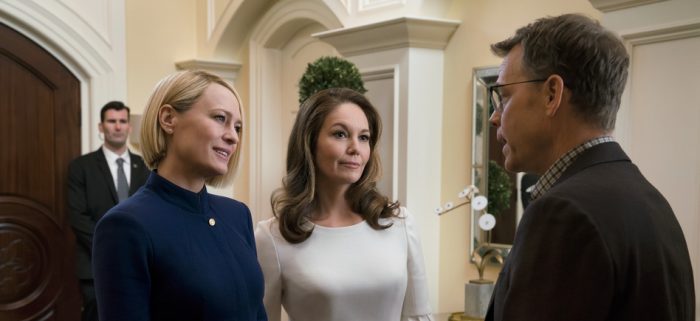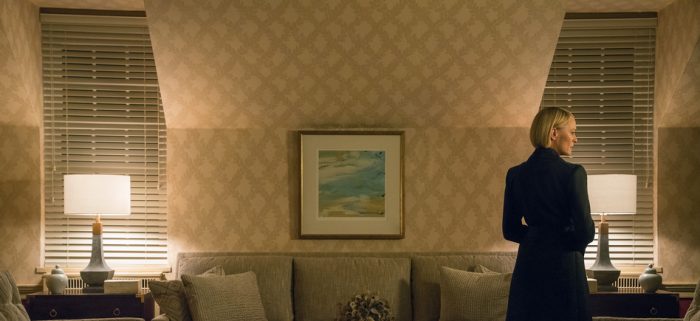'House Of Cards' Season 6 Review: The Final Season Is The Best It's Been In Years
House of Cards is ending with a significant amount of baggage due to the firing of star Kevin Spacey. But in its final season, the Netflix drama, which now has Robin Wright in the lead, is the best it's been in years. If House of Cards can get beyond the toxic aura created by Spacey, it might just end with one of its very best seasons.
For five seasons, Kevin Spacey was the face of House of Cards. His co-star Robin Wright shared a significant amount of screentime, but it was primarily Spacey's show. The series was a showcase for Spacey's talents, and he sank his teeth into the role of scheming, murderous President Frank Underwood. Last year, however, Spacey was fired from the show in the wake of allegations of sexual misconduct. Many wondered if the Netflix series would return at all, but plans were formed to continue with a final season by elevating Wright's character, First Lady turned Vice President turned President Claire Underwood, to lead. While it would've been nice to have Wright become the lead of a show under less unfortunate circumstances, her promotion helps improve House of Cards significantly. Here, in its final season, the series has regained some of its early strength.
House of Cards started strong, but the series began to be border on parody as it marched on. Spacey's Underwood became too cartoonishly evil, and his schemes were somehow both laughable complicated and yet easily accomplished. Episode after episode would present the same scenario: Frank would cook up some terrible plan, execute it flawlessly, and move on. Lather, rinse, repeat. The dramatic shift in the real political landscape didn't do the show any favors. Who wants to watch a show about a manipulative liar in the White House when we're all stuck in that real-life nightmare currently?
Season 6 remedies the show's past problems by shaking things up significantly. Part of that shake-up was inevitable in the wake of Spacey's firing, but to the show's great credit, it leans into change rather than running from it. I had wondered how directly the show would address the elephant in the room. Would Frank Underwood be quickly forgotten after the first episode, and never mentioned again, like a dirty secret? Or would House of Cards embrace its legacy, warts and all?
As House of Cards season 6 begins, Frank Underwood is dead. It's no spoiler to say this – trailers for the new season have revealed this fact, and Spacey's firing made it almost a given. While Frank's death is no mystery, just how he met his end is up for interpretation. House of Cards is in no rush to let the audience now how the former president's demise came about. At the end of season 5, Frank resigned the presidency, elevating his Vice President (and wife) Claire into the office. The plan, as Frank saw it, was to still work together with Claire behind the scenes. But Claire retaliated, and turned on Frank.
Now, in season 6, Frank's ghost seems to haunt Claire's White House. One of the biggest surprises of the season is how often Frank Underwood is mentioned. He may not be there in person, but Claire can't escape his legacy, or the terrible things he did. Nor can she escape the terrible things she did as well, both in service of Frank's ambitions, and her own. Throughout season 6, there's a growing sense that the past is going to catch up with Claire, and there's almost nothing she can do about it.
One thing is clear: no one is happy that Claire Underwood is President of the United States. She has enemies on all sides, and the first (fictional) female president has to work extra hard to hang onto power. There's an old adage (inspired by Ginger Rogers) that everything a man does, a woman has to do backwards, and in heels, to be taken just as seriously. While it would be silly to call the murderous Claire Underwood a feminist icon, Claire's femininity is very much a thorn in the sides of her enemies. She's perceived as weak – only in her position because she inherited it from her now-dead husband. But as anyone who has stuck with the show this long knows, thinking Claire is weak is a serious, and grave miscalculation.
While Claire is up against many potential foes – including troubled former White House Chief of Staff Doug Stamper (Michael Kelly), who was fiercely loyal to Frank – her biggest obstacles are the powerful Shepherd Family, wealthy power-players likely inspired by the real-life Mercer Family. Diane Lane and Greg Kinnear play sister and brother Annette Shepherd and Bill Shepherd, who have a tricky past with the Underwoods. Bill continually wants to exert power of Claire, and get her to do exactly what he wants. In other words, he wants a president firmly in his pocket. But Claire is resistant – a fact that confounds Bill. Kinnear plays the part with just the right air of aloof menace – he's a bit of a weirdo with almost no people skills. Lane's Annette is the face of the family – better at public events, and flashing a fake smile to get what she wants. Lane is strong here, portraying Annette as a lot more understanding than Bill, but just as treacherous. Also thrown into the mix is Duncan Shepherd (Cody Fern), Annette's son – the type of smug, self-righteous jerk who thinks he's a lot more powerful than he really is.
The supporting players are all strong here. Kelly's Doug Stamper is always a treat to watch, in all his conflicted madness. Patricia Clarkson steals scenes as Jane Davis, the Deputy Under Secretary of Commerce for International Trade, who always seems to know a lot more than she's letting on, and is willing to get her hands dirty. And Campbell Scott is a calming, but untrustworthy, figure as Mark Usher, former campaign adviser turned Vice President. But season 6 is Wright's turn to shine, and she's more than ready.
The actress commands the screen, and watching her slip into the lead comes across as natural, and welcome. As she adopts the third-wall breaking asides that Spacey made so famous, it never once seems forced, or strained. It's almost as if Claire's secret rage has been simmering in silence over the last five seasons, and now she's finally able to tell us how she really feels. Wright's icy coldness mixed with burning rage is a sight to behold, and part of the fun of this final season is watching her silently work out the issues plaguing her presidency.
House of Cards has stumbled significantly in the last few years, but as the show builds towards its conclusion, a true sense of urgency has returned. We're swept up in the drama again – fully engrossed in Claire's journey, and the darkness it entails. After Spacey's firing, House of Cards could've vanished from the television landscape in disgrace. Instead, it gets a chance to set things right, and end on a high note.
***
House of Cards season 6 debuts on Netflix on November 2, 2018.


